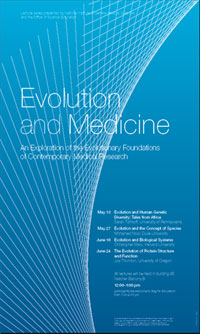Spring 2008 Lecture Series: Evolution and Medicine
The National Institute of General Medical Sciences (NIGMS) and the Office of Science Education (OSE) are partnering to present a lecture series, Evolution and Medicine. An outstanding group of scientists will present noon-time lectures on evolution as it applies to their area of scientific expertise. The program is open to all NIH employees and to the public.
All lectures take place in Building 45, Natcher Balcony B, from noon to 1 p.m. An informal discussion period will follow. Live webcasts will be available and archived at http://videocast.nih.gov/. American Sign Language (ASL) interpreters will be available upon request. If you require this or other reasonable accommodations to participate in this activity, please contact OSE at least 5 days prior to the event at (E-mail) moorec@mail.nih.gov, (Voice) 301-402-2470, or (TTY) 301-496-9706.
May 13 - Evolution and Human Genetic Diversity: Tales from Africa
Sarah Tishkoff of University of Pennsylvania will discuss the genomes of contemporary humans were shaped by evolutionary forces, such as mutation, selection, migration, and genetic drift. Because Africa plays a central role in the story of human evolution, research there is yielding a wealth of knowledge about human origins and diversity as well as a deeper understanding of evolutionary processes. Dr. Tishkoff has conducted ground-breaking research on African genetic diversity and the genetic basis of adaptation in humans.
May 27 - Evolution and the Concept of Species
Mohamed Noor of Duke University will discuss one of the great unresolved questions in biology is how continuous processes of evolutionary change produce discrete groups known as species. Grounding his work in contemporary evolution and genetics, Dr. Noor has made important contributions to an understanding of the molecular basis of speciation.
June 10 - Evolution and Biological Systems
Christopher Marx of Harvard University will discuss how microbes present an opportunity to study evolution on a small scale, both in time and space – and to address particularly vexing biological questions such as how organisms adapt to complex, changing environments. An emerging leader in the field of experimental evolution, Dr. Marx approaches this question by studying the evolution of physiological systems in microbial populations.
June 24 - The Evolution of Protein Structure and Function
Joe Thornton of University of Oregon will discuss how evolutionary biology's central task is to provide historical explanations for the diversity of living forms. At the molecular level, the question is how genes, and the proteins they code for, acquired their functions. By combining evolutionary and phylogenetic analysis with molecular and structural biology, Dr. Thornton has shown, atom by atom, how a biomedically crucial family of proteins -- the steroid hormone receptors -- changed over hundreds of millions of years to acquire their present-day functions.

